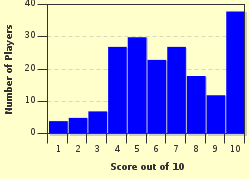Quiz Answer Key and Fun Facts
1. On your first day in Israel, the director calls you in order to get to know you. "I'm talking to you about Rachel your little daughter" he says. What does he mean?
2. The Israeli director tells you that he's set up a meeting to introduce you to the rest of the staff. "We're having the meeting on Tuesday," he explains "because Tuesday is twice good". Why is Tuesday considered "twice good"?
3. You cannot find the supplies you need in your office. You ask the secretary, Esther, if she can give you a hand. "Oh,I'll be willing to give you half of the kingdom" she says. What Biblical book is Esther quoting?
4. It's a hot day in Tel Aviv and the air conditioners all over the city are working overtime. Suddenly, the electricity goes off and the entire office building is plunged into darkness. "Oh no," yells your secretary, Esther, "It's as dark as..." How does Esther describe the darkness?
5. You and your Israeli staff finally finish the first part of your project. "Whew, that was really difficult" says Nachshon, one of your assistants. "It was like _____ the Reed (Red) Sea!" What word did Nachshon use to describe what happened near the Reed (Red) Sea?
6. You and your Israeli staff come upon some serious snags while completing the second part of the project. "I knew we were missing some vital information," moans Daniel, the statistician, "I should have seen the ______ on the wall!" What should Daniel have seen on the wall?
7. Shulamit has prepared a power-point presentation of the joint project to show in front of the entire company. "Wow, Shulamit," you tell her, showing off your Hebrew, "That presentation really finds favor in my eyes!" Where in the Bible can you find the phrase "to find favor in (someone's) eyes?
8. At one of the staff meetings, the director asks if anyone has a suggestion for a new product campaign. The room is strangely quiet; no one speaks or even raises a hand. "What's the matter" the director asks rather impatiently, "There is no voice and no answer". Which book of the Bible is he quoting from?
9. At a Board of Directors meeting, the CEO is introducing new employees. She introduces a number of people, and then says, "Last, last, beloved, our new employee from Quizzyland." Which Biblical character placed his most beloved family members behind other people?
10. On your last day in Israel, which coincides with your birthday, your friends take you out to a trendy bar in the Florentine neighborhood. Miriam and Aaron toast you by saying "You should live to be 120!" Which Biblical figure lived to be 120 years old?
Source: Author
janetgool
This quiz was reviewed by FunTrivia editor
LeoDaVinci before going online.
Any errors found in FunTrivia content are routinely corrected through our feedback system.

